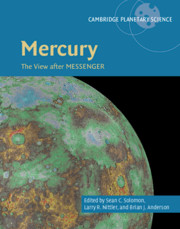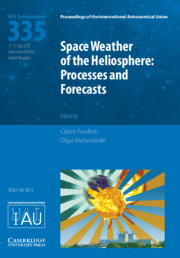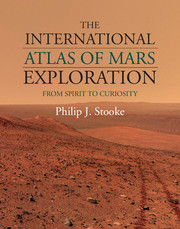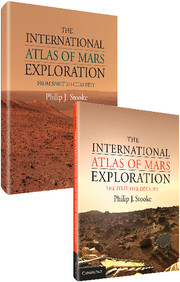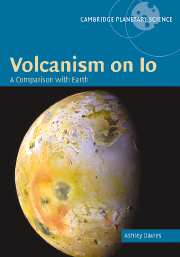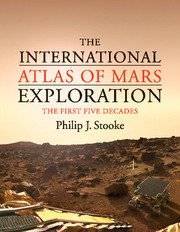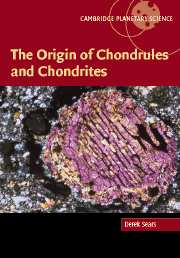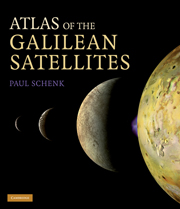Mercury
The View after MESSENGER
£49.99
Part of Cambridge Planetary Science
- Editors:
- Sean C. Solomon, Lamont-Doherty Earth Observatory, Columbia University, New York
- Larry R. Nittler, Carnegie Institution of Washington, Washington DC
- Brian J. Anderson, The Johns Hopkins University Applied Physics Laboratory, Laurel, Maryland
- Date Published: December 2018
- availability: In stock
- format: Hardback
- isbn: 9781107154452
£
49.99
Hardback
Other available formats:
eBook
Looking for an inspection copy?
This title is not currently available on inspection
-
Observations from the first spacecraft to orbit the planet Mercury have transformed our understanding of the origin and evolution of rocky planets. This volume is the definitive resource about Mercury for planetary scientists, from students to senior researchers. Topics treated in depth include Mercury's chemical composition; the structure of its crust, lithosphere, mantle, and core; Mercury's modern and ancient magnetic field; Mercury's geology, including the planet's major geological units and their surface chemistry and mineralogy, its spectral reflectance characteristics, its craters and cratering history, its tectonic features and deformational history, its volcanic features and magmatic history, its distinctive hollows, and the frozen ices in its polar deposits; Mercury's exosphere and magnetosphere and the processes that govern their dynamics and their interaction with the solar wind and interplanetary magnetic field; the formation and large-scale evolution of the planet; and current plans and needed capabilities to explore Mercury further in the future.
Read more- Provides a thorough synthesis of our knowledge of the planet Mercury following the recent completion of the MESSENGER mission, summarizing for the first time everything we have learned about the planet Mercury and how our view of the formation and evolution of rocky planets has changed as a consequence
- Written by members of the MESSENGER science team and selected additional experts who collectively span all fields of planetary science to ensure that every aspect of the planet is treated in a balanced and cohesive fashion
- The reference against which future observations of Mercury from Earth or spacecraft will be benchmarked; it will not be superseded by new spacecraft observations for many years
Reviews & endorsements
'An excellent Index and a list of Mercurian place names complete this volume. The editor and Cambridge University Press are to be congratulated upon bringing this huge publication to successful completion.' Richard McKim, The Observatory
Customer reviews
Not yet reviewed
Be the first to review
Review was not posted due to profanity
×Product details
- Date Published: December 2018
- format: Hardback
- isbn: 9781107154452
- length: 596 pages
- dimensions: 282 x 225 x 31 mm
- weight: 1.9kg
- availability: In stock
Table of Contents
1. The MESSENGER mission: science and implementation overview Sean C. Solomon and Brian J. Anderson
2. The chemical composition of Mercury Larry R. Nittler, Nancy L. Chabot, Timothy L. Grove and Patrick N. Peplowski
3. Mercury's crust and lithosphere: structure and mechanics Roger J. Phillips, Paul K. Byrne, Peter B. James, Erwan Mazarico, Gregory A. Neumann and Mark E. Perry
4. Mercury's internal structure Jean-Luc Margot, Steven A. Hauck, II, Erwan Mazarico, Sebastiano Padovan and Stanton J. Peale
5. Mercury's internal magnetic field Catherine L. Johnson, Brian J. Anderson, Haje Korth, Roger J. Phillips and Lydia C. Philpott
6. The geologic history of Mercury Brett W. Denevi, Carolyn M. Ernst, Louise M. Prockter and Mark S. Robinson
7. The geochemical and mineralogical diversity of Mercury Timothy J. McCoy, Patrick N. Peplowski, Francis M. McCubbin and Shoshana Z. Weider
8. Spectral reflectance constraints on the composition and evolution of Mercury's surface Scott L. Murchie, Rachel L. Klima, Noam R. Izenberg, Deborah L. Domingue, David T. Blewett and Jörn Helbert
9. Impact cratering of Mercury Clark R. Chapman, David M. H. Baker, Olivier S. Barnouin, Caleb I. Fassett, Simone Marchi, William J. Merline, Lillian R. Ostrach, Louise M. Prockter and Robert G. Strom
10. The tectonic character of Mercury Paul K. Byrne, Christian Klimczak and A. M. Celâl Sengör
11. The volcanic character of Mercury Paul K. Byrne, Jennifer L. Whitten, Christian Klimczak, Francis M. McCubbin and Lillian R. Ostrach
12. Mercury's hollows David T. Blewett, Carolyn M. Ernst, Scott L. Murchie and Faith Vilas
13. Mercury's polar deposits Nancy L. Chabot, David J. Lawrence, Gregory A. Neumann, William C. Feldman and David A. Paige
14. Observations of Mercury's exosphere: composition and structure William E. McClintock, Timothy A. Cassidy, Aimee W. Merkel, Rosemary M. Killen, Matthew H. Burger and Ronald J. Vervack, Jr
15. Understanding Mercury's exosphere: models derived from MESSENGER observations Rosemary M. Killen, Matthew H. Burger, Ronald J. Vervack, Jr, and Timothy A. Cassidy
16. Structure and configuration of Mercury's magnetosphere Haje Korth, Brian J. Anderson, Catherine L. Johnson, James A. Slavin, Jim M. Raines and Thomas H. Zurbuchen
17. Mercury's dynamic magnetosphere James A. Slavin, Daniel N. Baker, Daniel J. Gershman, George C. Ho, Suzanne M. Imber, Stamatios M. Krimigis and Torbjörn Sundberg
18. The elusive origin of Mercury Denton S. Ebel and Sarah T. Stewart
19. Mercury's global evolution Steven A. Hauck, II, Matthias Grott, Paul K. Byrne, Brett W. Denevi, Sabine Stanley and Timothy J. McCoy
20. Future missions: Mercury after MESSENGER Ralph L. McNutt, Jr, Johannes Benkhoff, Masaki Fujimoto and Brian J. Anderson.
Sorry, this resource is locked
Please register or sign in to request access. If you are having problems accessing these resources please email [email protected]
Register Sign in» Proceed
You are now leaving the Cambridge University Press website. Your eBook purchase and download will be completed by our partner www.ebooks.com. Please see the permission section of the www.ebooks.com catalogue page for details of the print & copy limits on our eBooks.
Continue ×Are you sure you want to delete your account?
This cannot be undone.
Thank you for your feedback which will help us improve our service.
If you requested a response, we will make sure to get back to you shortly.
×
